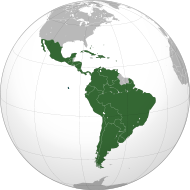Iran’s Quest To Expand Diplomatic Frontiers In Latin America – Analysis
By COHA
By Lemi Tilahun
While the West continues to read Iran as a threat to world peace, the Middle Eastern nation aggressively seeks non-traditional friends and markets elsewhere in an often stress-driven attempt to prove that the country is not as isolated, feared and despised as many in Europe and the United States make it out to be. To fight the sanctions that have been imposed on them from the outside, its leaders furiously attempt to enter into new allegiances is an imperative to boost the Iranian economy and support the ruling government’s self-interest. Once labeled as a charter member of the ‘Axis of Evil’, Iran has recognized the survival strategy of forging new partnerships while retaining old ones.

In 2009, President Mahmoud Ahmadinejad visited Brazil, becoming the first Iranian head of state to visit it since the early 1960’s. Iran’s involvement in Latin America is, without a doubt, widening and deepening. Many in the West, especially the United States see this as a security threat in their own backyard.
Since President Ahmadinejad came into power seven years ago, Iran has built six new embassies in Bolivia, Chile, Colombia, Ecuador, Nicaragua, and Uruguay. The emergence of these embassies shows the strength of Iran’s enhanced influence in the region. Prior to 2005, Iran had five embassies operating in Latin America; and in a span of seven years, they have managed to double that number.
Is Iran’s involvement in Latin America strategic, or is it simply a publicity stunt meant to prove Tehran’s diplomatic prowess or the new economy? The answer to this question is bound to vary, depending on the ideological orientation of the respondents.
Venezuelan political power brokers would likely disagree with the notion that Iranian diplomacy in Latin America is mainly more than just a publicity stunt, citing that Iran and Venezuela’s important partnership as founding members of Organization of the Petroleum Exporting Countries (OPEC). On the other hand however, the American perspective believes Iran’s actions appear to be a destabilizing threat to Washington’s diplomatic overtures in the U.S. sphere of influence.
Venezuela and Iran have developed a unique friendship mainly based on mutual distrust towards the U.S, embodied in Hugo Chavez and Mahmoud Ahmadinejad’s similar views on perceived abominating Western imperialism. The same is true for the Castro government in Cuba, which has welcomed, Ahmadinejad with open arms. Many argue that Iran’s involvement in the area is mainly political and lacks economic viability. However, one can easily recognize the benefits of a Tehran-friendly South America that refuses to comply with international economic sanctions imposed against Iran. Likewise, Iran’s burgeoning economic involvement in the region could potentially divert Latin American bound trade away from the U.S., which currently serves as the largest, or near largest trading partner for the vast majority of these countries.
On the political side of this discussion, Iran’s saber rattling rhetoric has been met with suspicion and skepticism in various parts of the world community. By targeting long-term alliances in Latin America, Iran is hedging its vulnerability to further isolation and global mistrust regarding its supposedly peaceful nuclear program. Tehran is not about to supersede Washington’s predominance in Latin America, but by encouraging anti-American sentiments amongst its newfound friends, Iran presumptively poses an irritating and complex foreign policy problem for the United States that by no means is readily solvable.
Author:
COHA Research Associate Lemi Tilahun
